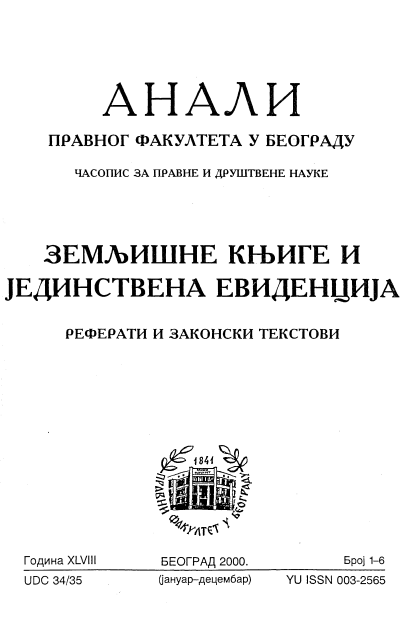УПИС ЕТАЖНЕ СВОЈИНЕ У ЗЕМЉИШНУ КЊИГУ И КАТАСТАР НЕПОКРЕТНОСТИ
RECORDING IN THE LAND REGISTER AND CADASTRE OF CONDOMINIUM UNIT OWNERSHIP
Author(s): Nina PlanojevićSubject(s): Civil Law
Published by: Правни факултет Универзитета у Београду
Keywords: Condominium ownership; Land registers; Book E; Cadastral index of immovables
Summary/Abstract: In this work thе land register and cadastral index of immovables are compared regarding the recording of condominium unit ownership. The current situation of land registers is not satisfactory, which is also due to normative reasons when apartment or unit ownership is concerned. The normative situation would improve by reviving and amending land registry legislation, based on prewar provisions and rules on the entry book „E“ stated in the Act on ownership of separate parts of buildings. Certain additions should be given to the book „E“, primarily for the recording of the collectively owned common areas. New elements included in the cadastral index of immovables are of no significance for the recording of the individual unit ownership (comprehensive records, entrusting it to administrative bodies), or can be useful (ex oficio recording, recording of possession). The rules on the registration of a building lot are not adequate for the condominium unit ownership. As far as cadastral survey is concerned, there is no provision on the recording of condominium common elements. Therefore, the document should be reduced to three instead of its current four parts. Part A would contain factual and legal description of the land; Part B factual and legal description of the building erected on the plot (when condominium unit ownership is concerned, it would also include the legal description of the unit and of the common elements), and Part C land charges and encumbrances. The most important task is to establish a functional and effective records, and it is also necessary to make people legally aware of the importance of real estate recording. Such records should be based on ex oficio estate recording, i.e. on strict conformity with the recording rules and reliability of land registers; they should also facilitate the recording of condominium common elements; finally, they should be maintained by the court and not an administrative body, and that through computer data processing. Apart from this, stamp duty on conveyancing transactions should be reduced as it is one of the main reasons for not recording a transfer of title.
Journal: Анали Правног факултета у Београду
- Issue Year: 48/2000
- Issue No: 1-6
- Page Range: 189-221
- Page Count: 33
- Language: Serbian

